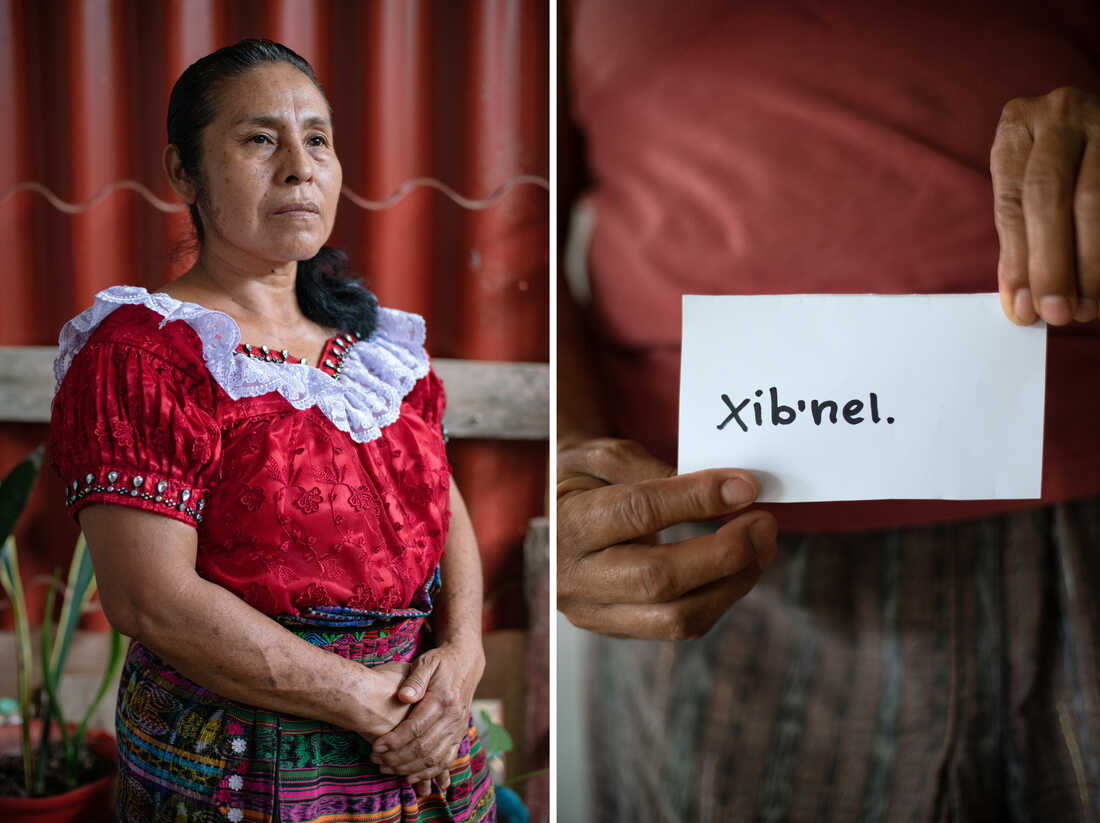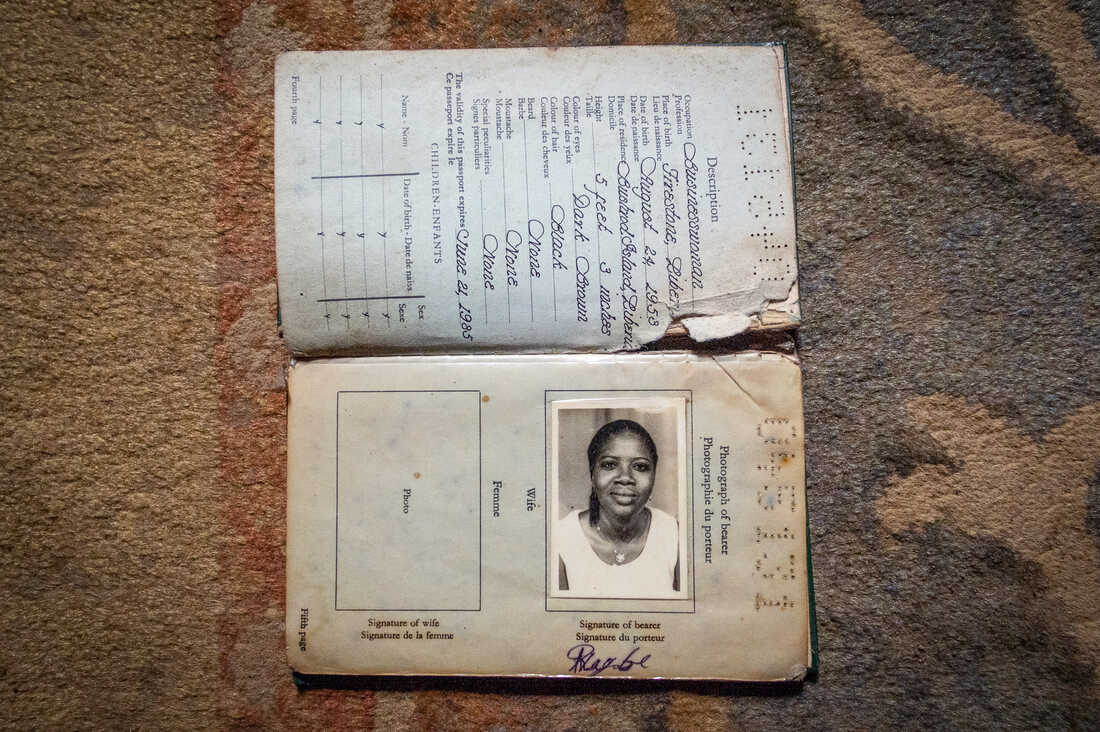Maybe it’s a piece of traditional clothing gifted by a parent. Or a bronze bowl used for religious ceremonies. Or a family recipe for a favorite dish.
These are all mere objects — but they aren’t just objects. A cherished keepsake can serve as a connection to your family, your roots, your sense of identity.
This kind of memento takes on new importance if you have to leave your homeland and set off for a new country and an uncertain new life.

Clockwise from left: A Liberian woman’s passport; incense stones from Yemen; a ceremonial cup and plate from an Indian village.
Clockwise from left: Ọbáṣọlá Bámigbólá, Yolanda Escobar Jiménez, Smita Sharma/for NPR
hide caption
toggle caption
Clockwise from left: Ọbáṣọlá Bámigbólá, Yolanda Escobar Jiménez, Smita Sharma/for NPR
At this time of unprecedented numbers of refugees — a record 27.1 million in 2021 — we wanted to know: What precious possessions are refugees taking with them? The photojournalists of The Everyday Projects interviewed and photographed eight refugees from around the globe. Here are the objects they said give them comfort, solace and joy.
Editor’s note: If you have a personal tale about a special possession from your own experience or your family’s experience, send an email with the subject line “Precious objects” to [email protected] with your anecdote and your contact information. We may include your anecdote in a future post.
For more details on the lives of the 8 refugees profiled below, read this story.

Olha Abakumova, an opera singer from western Ukraine, came to the U.S. with her daughter. (Her husband was not able to migrate.) Olha brought her most treasured sheet music for Ukrainian arias. “They connect me with my motherland, culture and my roots,” she says. “When I’m singing, I see pictures in front of my eyes,” she says. “The words and music move through me and take me back to Ukraine.”
Jodi Hilton for NPR
hide caption
toggle caption
Jodi Hilton for NPR

Olha Abakumova, an opera singer from western Ukraine, came to the U.S. with her daughter. (Her husband was not able to migrate.) Olha brought her most treasured sheet music for Ukrainian arias. “They connect me with my motherland, culture and my roots,” she says. “When I’m singing, I see pictures in front of my eyes,” she says. “The words and music move through me and take me back to Ukraine.”
Jodi Hilton for NPR

Nilofar Niekpor Zamani, who fled her homeland of Afghanistan and now lives in the Netherlands, made room in her crammed suitcase for a dress her mother gave her as a wedding gift: “I understand today that I couldn’t leave the dress and the memory of my mother. I didn’t know if I would see her again. I couldn’t leave this symbol of my ancestors that never lets me forget where I belong.”
Nilofar Niekpor Zamani for NPR
hide caption
toggle caption
Nilofar Niekpor Zamani for NPR

Of all her belongings, this diary is the most important, says Kataleya Nativi Baca, a transgender woman who says she fled Honduras because of fears for her safety and now lives in Virginia. The diary includes a letter to her mom about living a few steps away from the U.S. in Tijuana and lyrics to a song that begin “It was a long journey, but I’ve finally arrived.”
Danielle Villasana for NPR
hide caption
toggle caption
Danielle Villasana for NPR

As cyclones grew more intense because of climate change, Pramila Giri left her village in India for a growing metropolis. Considered a climate refugee, she works hard as a cook, sending money home to her family. She brought with her a ceremonial bowl and plate made of bronze, putting rice pudding in the bowl and a salty lentil porridge on the plate for special occasions and festival offerings.
Smita Sharma for NPR
hide caption
toggle caption
Smita Sharma for NPR

Rosa Gonzalez, born in Guatemala, holds a sign with the word “Xib’nel” from the K’iche’ Mayan language she grew up speaking — loosely translated as “the fright, the terror.” Gonzalez says this word sums up how she felt during the war in her country. She has no physical keepsakes to remind her of her childhood home but proudly speaks her language of K’iche’: It is “fundamental to who we are.”
James Rodríguez for NPR
hide caption
toggle caption
James Rodríguez for NPR

Rosa Gonzalez, born in Guatemala, holds a sign with the word “Xib’nel” from the K’iche’ Mayan language she grew up speaking — loosely translated as “the fright, the terror.” Gonzalez says this word sums up how she felt during the war in her country. She has no physical keepsakes to remind her of her childhood home but proudly speaks her language of K’iche’: It is “fundamental to who we are.”
James Rodríguez for NPR

Across the Arabian peninsula, people light scented stones like incense. “You light them on fire for a good smell,” says Nader Alareqi, who left Yemen because of the civil war and now lives in Ecuador. When packing to leave in 2015 he brought incense stones made by his grandmother with a mixture of perfumes and scented leaves: “These are very special stones made with love.”
Yolanda Escobar Jiménez for NPR
hide caption
toggle caption
Yolanda Escobar Jiménez for NPR

Momos are steamed or fried dumplings stuffed with minced meat or vegetables — a popular dish in Abdul Kareem Bhat’s native Tibet. He fled after the failed uprising against China in 1959. Now living in Kashmir, Bhat says that serving the dish at his restaurant not only connects him to his roots but has “brought us closer to our Kashmiri brothers.”
Showkat Nanda for NPR
hide caption
toggle caption
Showkat Nanda for NPR

“This passport reminds me of my past life, traveling across West Africa,” says Rebecca Maneh Nagbe, known as Mama Sckadee. She fled Liberia’s civil war in 2003 and came to a refugee camp in Nigeria but has been unable to obtain legal status to leave. In the camp, she has raised her granddaughter, whose mother left the country: “Angel has been my companion for 14 years. She is all I have.”
Ọbáṣọlá Bámigbólá for NPR
hide caption
toggle caption
Ọbáṣọlá Bámigbólá for NPR

“This passport reminds me of my past life, traveling across West Africa,” says Rebecca Maneh Nagbe, known as Mama Sckadee. She fled Liberia’s civil war in 2003 and came to a refugee camp in Nigeria but has been unable to obtain legal status to leave. In the camp, she has raised her granddaughter, whose mother left the country: “Angel has been my companion for 14 years. She is all I have.”
Ọbáṣọlá Bámigbólá for NPR
Additional credits
Visuals edited by Ben de la Cruz, Pierre Kattar and Maxwell Posner. Text edited by Julia Simon and Marc Silver. Copy editing by Pam Webster.
